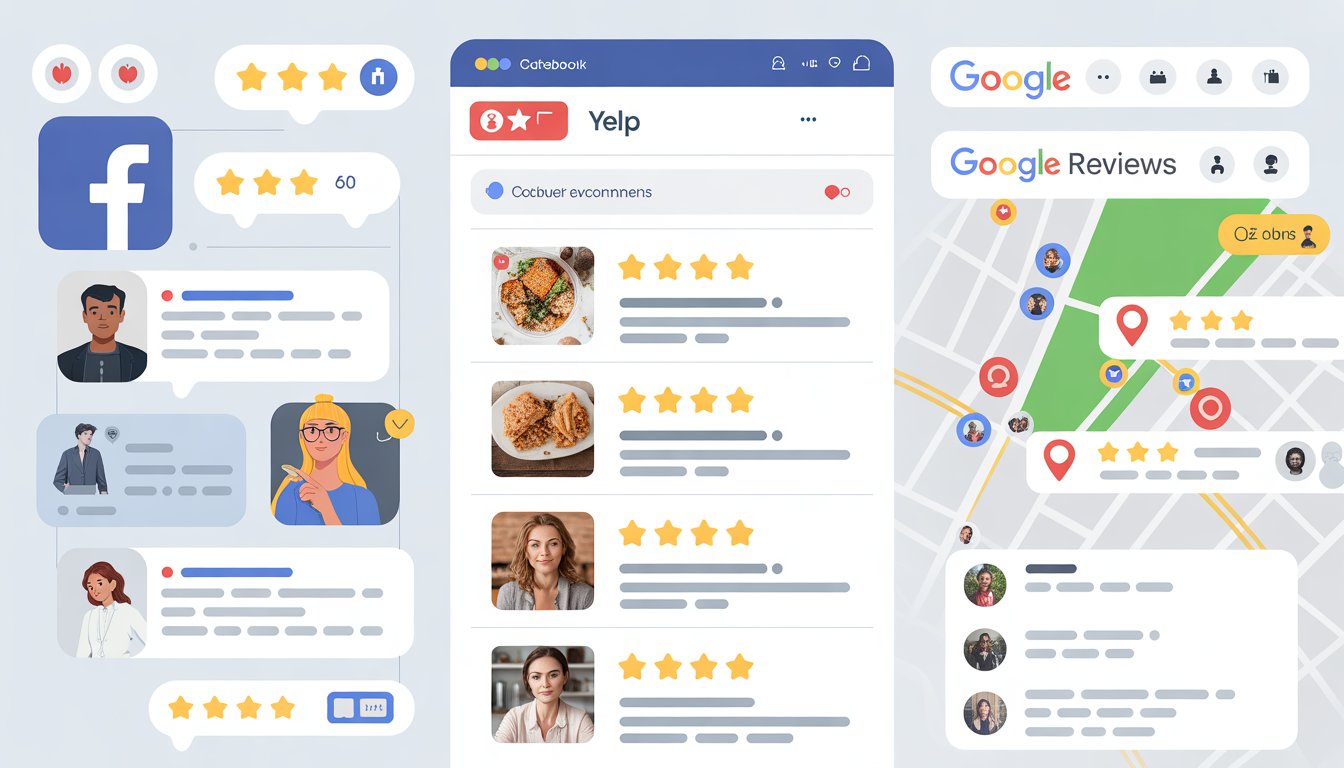Most business owners know that customer reviews matter for their reputation. Many don't realize that responding to those reviews can boost their search engine rankings.
Yes, responding to reviews does help with SEO by showing search engines that your business is active and engaged with customers. Google has confirmed that review responses improve your local search rankings and help you appear in the top local search results.

When you respond to reviews, you create fresh content that search engines can index. This activity signals to Google that your business cares about customer feedback and stays involved with your online presence.
The average customer reads nearly five reviews before making a decision. Your responses become part of the content they see.
Your review responses do more than just improve search rankings. They build trust with potential customers who read them and show that you value feedback.
Whether someone leaves a five-star review or complains about their experience, your response can turn that interaction into an SEO advantage. It also strengthens your brand reputation.
Key Takeaways
- Responding to reviews improves your local SEO rankings and helps you appear higher in search results.
- Review responses create fresh, engaging content that signals business activity to search engines.
- Strategic responses to both positive and negative reviews build customer trust and long-term online success.
How Do Review Responses Impact SEO?

Review responses create measurable benefits for your search engine optimization through direct ranking improvements and increased customer trust signals. These responses work as a local SEO factor that Google uses to determine your business visibility in search results.
Direct Effects on Local Search Rankings
Google treats review responses as a confirmed local SEO ranking factor. When you respond to reviews, you signal active business management to search engines.
Local search rankings improve when you consistently respond to both positive and negative reviews. The timing of your responses matters significantly for SEO impact.
Reviews carry more weight in determining map pack rankings than regular local search results. Your response activity directly influences where you appear in these prominent search features.
Key ranking factors include:
- Response frequency - How often you reply to reviews
- Response speed - How quickly you address new reviews
- Response quality - Whether your replies add value
Search engines view businesses that engage with customers as more trustworthy and relevant. This engagement translates into better positions on search engine results pages.
Role in Google Business Profile Optimization
Your Google Business Profile becomes more optimized when you actively respond to reviews. Google values businesses that show customer engagement through their platform.
Review responses add fresh content to your business profile regularly. This content signals to Google that your business stays active and current.
Response consistency helps improve your overall profile strength. Businesses that respond to all reviews perform better than those that ignore customer feedback.
Your responses create additional opportunities to include relevant keywords naturally. This helps your profile appear for more local search terms.
Google's algorithm considers response patterns when determining business credibility. Profiles with regular response activity gain authority in local search results.
Signaling Trust and Business Activity
Review responses serve as strong trust signals that impact your online visibility. Search engines interpret consistent responses as proof of legitimate business operations.
Active response patterns demonstrate business reliability to both customers and search algorithms. This reliability factor influences your search engine rankings.
Trust signals from review responses include:
- Timely customer service
- Professional communication
- Problem resolution willingness
- Ongoing business presence
Search engines use these signals to determine which businesses deserve higher visibility. Your response activity directly affects how search algorithms evaluate your business credibility.
Consistent review management shows search engines that your business maintains quality standards. This ongoing activity helps sustain and improve your search engine optimization results over time.
Customer Engagement Through Review Responses

Responding to reviews creates active dialogue with customers that generates valuable engagement signals for search engines. This interaction boosts user-generated content while encouraging more customer feedback and improving click-through rates on your business listings.
User-Generated Content and Its SEO Value
Review responses create fresh, relevant content that search engines value. When you reply to customer feedback, you add new text to your business profiles regularly.
This user-generated content includes keywords customers naturally use when describing your business. Search engines see this ongoing conversation as proof your business stays active.
Key SEO benefits of review responses:
- Fresh content updates signal business activity
- Natural keyword usage from real customer language
- Increased text content on your business profiles
- Regular content updates improve search visibility
Your responses also encourage customers to leave more detailed reviews. When people see you reply to feedback, they often write longer, more descriptive reviews.
These longer reviews contain more keywords and specific details about your services. This extra content helps search engines understand what your business offers.
Encouraging More Reviews and Feedback
Responding to reviews motivates other customers to share their experiences. Studies show that 53% of customers expect businesses to reply to their reviews.
When potential customers see you actively respond, they feel more confident leaving their own feedback. This creates a cycle that increases your total review count over time.
Ways responses encourage more reviews:
- Customers see you value their opinions
- Public replies show you care about feedback
- Response quality influences future review decisions
- Active engagement builds customer trust
Quick responses work best for encouraging new reviews. Most customers expect replies within 24 hours of posting their review.
Late responses can hurt your chances of getting future reviews. Customers may think you don't care about their feedback if you take too long to respond.
Boosting Click-Through Rates via Engagement Signals
Search engines track how users interact with your business listings. When people spend time reading your review responses, it sends positive engagement signals.
These signals tell search engines that users find your content valuable. Higher engagement often leads to better search rankings and visibility.
Engagement signals from review responses:
- Time spent reading your replies
- Clicks on your business profile after reading responses
- Return visits to check for new responses
- Social sharing of positive interactions
Reviews with responses get more attention than those without replies. People spend longer reading through conversations between businesses and customers.
This extra time on your listing improves your click-through rate. When users engage more with your content, search engines may show your business to more people.
Your response quality affects how long people stay on your listing. Helpful, professional replies keep users reading and increase engagement metrics.
Handling Positive and Negative Reviews Effectively
Your approach to handling both positive and negative reviews directly affects your SEO performance and brand perception. Quick responses to all customer reviews show search engines that you actively manage your online reputation and value customer satisfaction.
Addressing Negative Reviews for Reputation Management
Negative reviews require immediate attention to protect your online reputation management efforts. Respond within 24-48 hours to show potential customers that you care about resolving issues.
Start your response by acknowledging the customer's concerns. Thank them for taking time to share their feedback.
Apologize when appropriate without admitting fault. Use phrases like "We're sorry you had this experience" rather than "We're sorry we made a mistake."
Move the conversation offline quickly. Provide your email address or phone number.
This prevents further public discussion while showing your commitment to customer service. Keep responses professional and calm.
Never argue or become defensive. Other potential customers will read these exchanges and judge your brand perception based on how you handle criticism.
Reference specific details from their review when possible. This personalizes your response and shows you actually read their feedback carefully.
Maximizing the Impact of Positive Reviews
Positive reviews offer valuable opportunities to strengthen your brand perception and encourage more customer feedback. Respond to these reviews promptly to show appreciation and maintain engagement.
Thank customers by name when they provide it. Mention specific services or products they praised.
This creates more authentic responses than generic thank-you messages. Highlight your unique selling points in positive review responses.
If a customer mentions your fast service, reinforce this strength for future readers. Keep responses short and genuine.
A simple thank you with one specific detail works better than lengthy responses that seem forced or sales-focused. Use positive review responses to invite customers back.
Mention new services or upcoming promotions they might enjoy based on their previous experience. These responses create additional content that search engines can index.
They also demonstrate ongoing customer satisfaction to potential new customers reading your reviews.
Best Practices for Responding to Reviews
Quick, consistent responses with local keywords help maximize your SEO benefits from review management. The timing of your replies and strategic keyword use directly impact your local search results.
Timeliness and Consistency in Responses
Response speed matters more than you might think for local SEO strategy. Google tracks how quickly businesses reply to reviews and uses this data to judge your online presence quality.
Aim to respond within 24-48 hours of receiving any review. This shows Google that you actively manage your business profile.
Quick responses also signal to customers that you care about their feedback. Set up review alerts so you know immediately when new reviews arrive.
Most businesses get the best results when they check for new reviews daily. Be consistent with your response schedule.
Don't reply to some reviews in hours and others in weeks. This inconsistency can hurt your local search rankings.
Review recency plays a big role too. Fresh review activity combined with timely responses tells Google your business is active and engaged.
Using Relevant Keywords and Local Context
Your review responses are content that Google reads and indexes. This gives you chances to include keywords that help your search engine optimization efforts.
Include your city name and neighborhood when responding to google reviews. This strengthens your local search signals.
For example: "Thanks for choosing our downtown Phoenix location." Mention specific services naturally in your replies.
If someone reviews your pizza restaurant, you might say "We're glad you enjoyed our wood-fired pizzas and craft beer selection." Don't stuff keywords unnaturally.
Google can spot fake-sounding responses that prioritize SEO over genuine customer interaction. Use the same terms your customers use in their reviews.
If they call it "car repair," use that phrase instead of "automotive service." This matching helps Google connect your business to relevant searches.
Address local landmarks or areas when relevant. This adds geographic context that supports your local SEO strategy.
Influence of Review Platforms on SEO
Different review platforms carry varying levels of SEO weight, with major sites like Google Reviews having the strongest impact on search rankings. The integration of these platforms with your business website creates additional pathways for improved online visibility.
Key Review Sites for Local SEO
Google Reviews holds the most power for local SEO rankings. Google uses review count and star ratings directly in its search algorithm.
Your Google Business Profile reviews appear in local search results and influence your position in the local pack. Facebook Reviews ranks as the second most important platform.
Facebook reviews show up in search results and can appear as rich snippets. The platform's massive user base makes these reviews highly visible to potential customers.
Yelp Reviews significantly impacts local search, especially for restaurants and service businesses. Yelp pages often rank high in Google search results for business names and local queries.
Industry-specific review sites also matter for SEO. Sites like TripAdvisor for travel, Healthgrades for healthcare, and Angie's List for home services carry weight in their respective sectors.
These platforms often have strong domain authority and rank well in search results.
Integration with Business Websites
Review platforms boost your website's SEO through structured data markup. Adding review schema to your site helps search engines understand your ratings and can trigger star ratings in search results.
Review widgets on your website create fresh content that search engines crawl. This user-generated content includes keywords customers naturally use when describing your business.
The constant addition of new reviews signals to search engines that your site stays active. Local citations from review platforms strengthen your online presence.
When review sites list your business name, address, and phone number, they create valuable backlinks and verify your business information across the web. Review platforms also generate social signals that search engines consider.
High engagement on review sites indicates business popularity and trustworthiness to search algorithms.
Leveraging Review Responses for Long-Term Online Success
Review responses create lasting benefits by building customer loyalty and protecting your brand image. These efforts strengthen your online reputation management strategy and improve how people see your business.
Improving Customer Experience and Advocacy
Responding to reviews shows customers you value their feedback. This creates a better customer experience that goes beyond a single transaction.
When you reply to positive reviews, you make customers feel heard. Personalize your responses by mentioning specific details from their review.
Thank them for choosing your business and invite them back. Your responses to negative reviews matter even more.
Address problems quickly and offer solutions. This turns unhappy customers into loyal ones.
Customer feedback becomes a tool for growth when you respond properly. Use review responses to:
- Show your brand personality
- Highlight your customer service
- Build trust with future customers
People who see your thoughtful responses are more likely to choose your business. They know you care about fixing problems and making customers happy.
Sustaining a Positive Online Reputation
Your review responses protect your online reputation over time. Each response shows potential customers how you handle both praise and criticism.
Brand perception improves when people see consistent, professional responses. Your replies become part of your business story on review sites.
Review recency plays a big role in local search rankings. Fresh responses to new reviews signal to search engines that your business stays active.
Online reputation management requires ongoing effort. Set up a system to respond to reviews quickly.
Most customers expect responses within a few days. Your responses stay visible for years.
They become permanent examples of your customer service. Make each response count by staying professional and helpful.
Track how your review response strategy affects your business. Look for changes in new customer inquiries and repeat business rates.
Frequently Asked Questions
Responding to reviews affects SEO through both direct and indirect factors that search engines consider when ranking businesses. The timing, content, and approach of your responses all play important roles in how effectively they boost your search visibility.
How does responding to Google reviews impact search engine rankings?
Google's official local ranking guide lists managing and responding to reviews as a factor that helps local SEO. Your engagement on your Business Profile helps it rank higher in the Map Pack results.
Review responses don't directly change your search rankings. Instead, they work indirectly by improving user engagement signals that Google tracks.
When you respond to reviews, you show search engines that your business stays active online. This activity creates fresh content on your profile regularly.
What are the benefits of replying to reviews for a business's online presence?
Responding to reviews builds trust with potential customers who read your responses. This trust leads to higher click-through rates from search results.
Your responses show that you care about customer service. People are more likely to choose businesses that actively engage with feedback.
Review responses can encourage more customers to leave reviews. More reviews generally improve your local search visibility and rankings.
Can the content of review responses influence SEO outcomes?
The words you use in review responses become part of your business profile content. Search engines can read and index this text.
Using relevant keywords naturally in your responses may help with local search terms. Don't stuff keywords unnaturally into responses though.
Detailed, helpful responses provide more content for search engines to understand your business. This extra context can improve how you show up for related searches.
Should businesses prioritize responding to negative reviews, and what effect does this have on SEO?
You should respond to negative reviews professionally and helpfully. Google values how you handle difficult situations with customers.
Negative review responses show potential customers that you fix problems. This builds confidence and can increase your conversion rates from search traffic.
Don't attack reviewers or get defensive in responses. Google prohibits this behavior and it hurts your business reputation.
Focus on solving the problem and showing other potential customers how you handle issues. This approach builds trust and improves user engagement signals.
Are there best practices for responding to reviews that can positively affect SEO performance?
You don't need to respond to every single review individually. Focus on meaningful, courteous interactions that add value.
Keep responses professional and helpful. Thank positive reviewers and address concerns from negative reviews constructively.
Use natural language that includes relevant business terms. Avoid keyword stuffing but mention your services when it fits naturally.
Respond in a way that helps other potential customers. Your responses are public and influence people's decisions about your business.
How important is the timeliness of a review response in terms of SEO benefits?
Quick responses show search engines that your business profile stays active. Regular activity signals help with local search performance.
Faster responses improve customer satisfaction scores. Happy customers are more likely to leave additional positive reviews.
You don't need to respond within minutes. Responding within a few days shows good customer service.
Consistent response timing matters more than speed. Regular engagement over time builds stronger SEO benefits.










